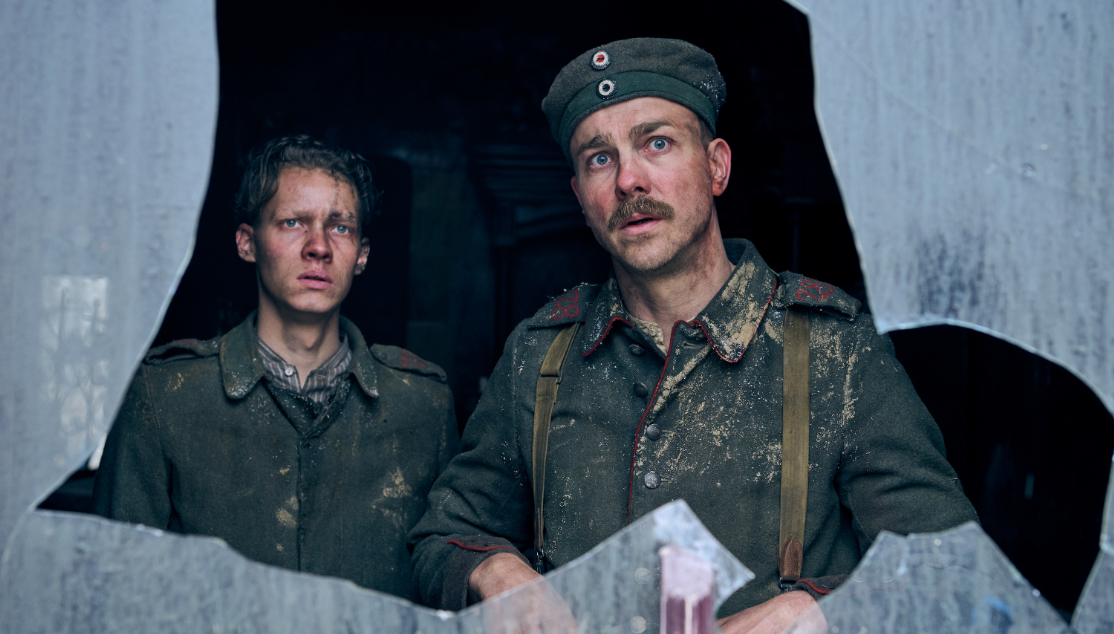
Film Review: All Quiet on the Western Front
Film Reviews
All Quiet on the Western Front
Director: Edward Berger
Amusement Park
Streaming on Netflix 10.28
The brutality of war has been captured on film many times before, and in the modern age we’ve seen some masterpieces of the genre, including Dunkirk, 1917 and most influentially, Saving Private Ryan. However, all of these films owe more than little to Erich Maria Remarque‘s novel All Quiet on the Western Front, arguably the greatest chronicle of modern war ever put on paper.
All Quiet on the Western Front follows Paul Bäumer (Felix Kammerer, David im Wunderland), a young man in Germany in 1917, who lies about his age so that he can join his friends, a group of wide-eyed volunteers with lofty notions about fighting for the glory of the Kaiser’s Empire on the vasty fields of France. While Paul’s journey starts with dreams of adventure and coming of age, these romantic notions soon give way to the nightmare of reality in its most unforgiving form. Paul is thrust into the mud and blood of the trenches with little training and a sudden, horrifying realization that the only cause that matters is survival, as one nameless, pointless battle after another is revealed to be anything but glorious. Life becomes periodic episodes of chaos and carnage punctuating the loneliness and despair that Paul feels as he watches hundreds of boys just like him become ripped apart, giving their lives in pursuit of gaining miniscule patches of desolate land.
It’s been over 20 years since I last read Remarque’s masterpiece, so it’s not entirely fresh in my mind, and yet it’s not a book that one easily forgets. While some significant liberties have been taken, I still consider Berger’s adaptation to be bordering on definitive. It’s not just that it’s the long overdue, first major German language adaptation of All Quiet on the Western Front, though that certainly helps. Berger deftly captures the bleak tone and sense of disillusionment of Remarque’s narrative, and the portrayal of Paul’s descent into hopelessness is unflinching yet elegant, as we watch this naive, idealistic youth lose his grip on everything he’s ever known and believed to be true.
Some liberties are taken with the first-person structure of the book, as Berger has added cutaways to Matthias Erzberger, the German minister of finance, played by Daniel Brühl (Inglourious Basterds, Captain America: Civil War), who is working toward negotiating the terms of ending the war. The motivation for this is at least in part simply to give the film a recognizable star presence, with Brühl very nearly the only actor who could help draw in both German and American audiences, though it feels less intrusive and becomes engrossing as the film progresses. Still, All Quiet on the Western Front is at its best when it is focused on the Western Front and the struggle to make it through the war in one piece.
Kammerer gives a stellar performance as Paul, making him a sympathetic young everyman with whom we can easily identify, and he makes for an effective point of view character. Albrecht Shuch (Berlin Alexanderplatz) is terrific as Stanislaus “Kat” Katczinsky, a more seasoned soldier who serves as a mentor and older brother figure to Paul, while Aaron Hilmer is thoroughly unforgettable as Kropp, a fellow soldier who went to school with Paul. Brühl is quite effective in his sequences, and it’s surprising how much tension Berger is able to build as the armistice talks edge toward a conclusion.
All Quiet on the Western Front is certainly a must see for history buffs, and while Remarque didn’t like to label it as an “anti war” story, it’s hard to imagine a more persuasive argument against the notion that there is anything romantic or glorious about the entire enterprise, and on this level and nearly every other, Berger has more than done justice to the profound source material. In a year when the patriotic nostalgia of Top Gun: Maverick reminds us of how effective movies can be in driving military recruitment, bringing back a sense of the “be all that you can be” xcitement of the ’80s, Berger’s version of All Quiet on the Western Front should be required viewing as a counterpoint for young people who are considering joining the Armed Forces. –Patrick Gibbs